Unhappy Bahu Bike, Queen of Dagestan
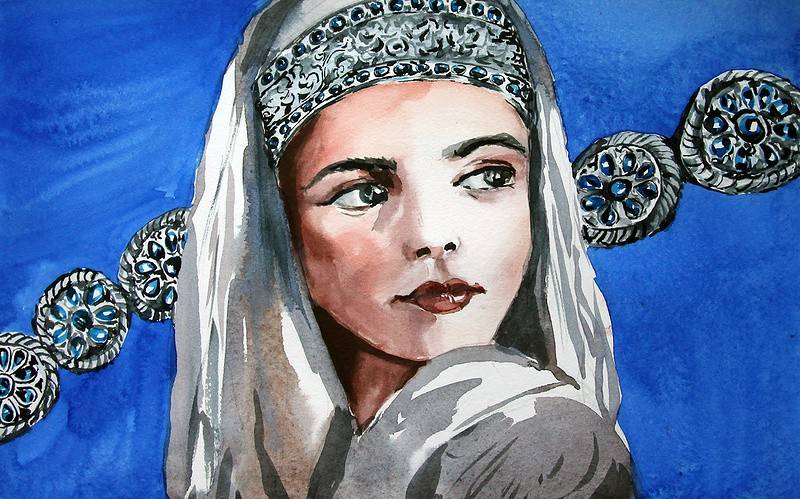
The first half of the 19th century was a difficult time for Dagestan (now a single republic). Dagestan was torn by local rulers into separate competing possessions: Tarkov shamshalstvo, Mehtulinsky possession, Kyurinsky, Kazikumukh (Kazikumyk) and Avar khanates, etc. Unions were created and collapsed. And Muridism, which came to this earth, made the situation even more complicated.
Until the 1801 year, the Avar Khanate was ruled by the Ummah Khan of Avar, nicknamed the Great. He greatly expanded the possessions of the accident, and the king of Georgia, Heraclius II, like most khans of Dagestan and Azerbaijan, paid him tribute. It was Ummah Khan, after a series of requests sent to Petersburg, that was accepted into the Russian Empire. The trouble with the powerful khan was that the three wives never brought him an heir. Only two girls were born. One of them was Bahu Bike (Pahu Bike).
Bahu-Bike married a noble man of the Tarkov shamkhal family Sultan-Ahmed. When there were no pretenders to the khan’s throne, Bahu-Bike persuaded the nobility to support her husband. For a short time, Sultan-Ahmed became a khan in the capital of the khanate - Khunzakh (now an Avar village in Dagestan with 4 thousand inhabitants).
The rise of the Hanshi
In the 1823 year, Sultan Ahmed passed away. Nutsal Khan, Ummah Khan, Bulach Khan and the young daughter of the Sultanate, the children of the Khan, were still very young. Therefore, the board was forced to take Bahu-Bike into its own hands. She was not militant, but was highly respected and loved by the Khunzakh people. Stately, proud, according to her title, unusually beautiful and at the same time charming and hospitable. Her hospitality was famous throughout Dagestan.
The reign of Bahu Bike promised to be a time of peace and tranquility in the khanate. Unlike her father, she did not seek to start wars, continued her course on Russian citizenship, successfully defended the khanate from the Murids, and preferred to resolve disputes with profitable marriages, for which she was often credited with intrigue. Her young children grew up as brave, worthy men, and the beautiful Sultanate was one of the most enviable brides of the Caucasus. Alas, this partly caused the fall of their dynasty.
The Hunzans have long been in alliance with the Kazikumukh khanate, and the Bahsha Khan was completely with the Aslan Khan Kazikumukh in kinship. However, when it came time to marry the matured children, Nutsal married the daughter of Shamkhal Tarkovsky, and the beautiful Sultanat attracted the son of the shamkhal. Bahu Bike did not prevent this, hoping that it could increase the lands of the accident at the expense of new relatives. But the refusal of the right of the son of Aslan Khan to marry the Sultanate infuriated him, and from now on he broke the old alliance in the fight against murids and the Caucasian gazavat itself.
Soon the news of the disagreement between Aslan Khan and Bahu Bike spread throughout the Caucasus. Hansha, realizing that Ghazi-Muhammad, the imam and the old enemy of the pro-Russian Hunzakh, would soon send his army to its lands, sent Nutsal to Tiflis to the Russian command. But the war with murids distracted great forces, and so the command provided substantial financial assistance and insisted that it be used to form detachments of the mountain police.
Disappointment in hopes
Soon the news spread across the Caucasus that the irreconcilable Gazi was killed in a battle with the Russian troops during the assault on the village of Gimra, while Shamil was seriously injured. So there was hope. The new imam was Gamzat-bek, an associate of Shamil, as well as a distant relative of the children of Bahu-Bike. The main thing is that, according to the old laws of Atalism, Gamzat-bek not only lived in Khunzakh, but was adopted in the Khan’s palace, and Bahu treated him as his own son. Therefore, the woman quite legitimately believed that Gamzat would leave the khanate alone.
But suddenly Gamzat made the most radical demands on Bach, depriving the khanate, in fact, of any independence. On the advice of the elders and the Qadis (judges), Khunzakh Khansha replied to Gamzat that she was ready to accept Sharia on her land, but she would not break the alliance with the Russians. The imam accepted the answer with mock calm, but demanded one of the sons of the khanate to be himself an amanate. Bahu decided that Gamzat would not dare to touch her native blood, and sent eight-year-old Bulach to him.
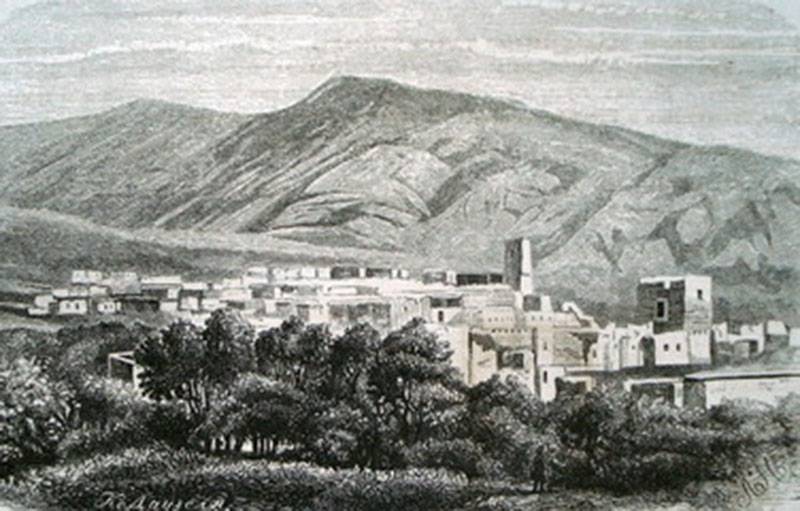
It would seem that the conflict has been settled. But the insidiousness of Gamzat Bahu was clearly underestimated. After some time, not far from the capital of the Khanate, horsemen loyal to Hunzahu discovered the army of Gamzat, who set up camp. Now the imam demanded the immediate submission of the accident to his will. Moreover, having learned what danger the eight-year-old Bulach was in, his quick-tempered brother Ummah Khan went to the Murid camp with the aim of helping the boy out, but he was captured.
Bahu Bike was furious and distressed at the loss of her two sons. She demanded from Nutsal that he immediately rescue the brothers from trouble. Nutsal replied that without a large detachment it would be pointless to go to Gamzat, and asked for a little time to assemble an army of loyal nukers. However, Bahu lost all caution from grief and ordered to leave for negotiations immediately. Nutsal only finally abandoned that his mother did not understand the treachery of Gamzat and would lose all her sons. The unfortunate Nutsal at that moment said prophetic words.
Terrible reprisal
Gamzat-bey received Nutsal and his nukers with pretended hospitality and invited the khan to his tent. The imam immediately thrilled the young Nutsal with a proposal to lead the entire Murid detachment and to receive the imam title himself, while Gamzat himself will enter the Khunzah. Nutsal protested, complaining that even in the Qur'an he understood poorly. Suddenly, as if this had been previously agreed upon, Shamil, who was in the same tent, accused the Khunzans that they were all infidels. At this moment, Gamzat jumped up and led Nutsal and his captive brothers to pray.
Having performed the prayer, everyone went to the tents. On the way, Gamzat suddenly transformed, with the very last words, insulted Nutsal and his brothers. After Nutsal was called the enemy of Islam, he could not stand it and pulled out a saber. This is exactly what the insidious imam was waiting for. One of his bodyguards shot the young Ummah Khan walking nearby in the blink of an eye. Nutsal and his nukers realized that this was the last battle, therefore, with all the bitterness, they rushed to the opponents. Shots struck, and steel spoke.
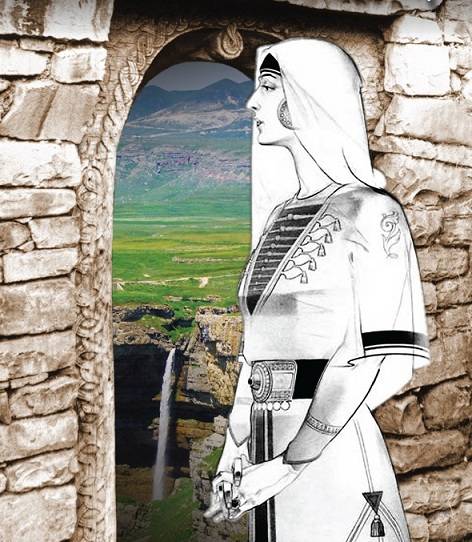
Nutsal, despite the absolute hopelessness of the situation, fought fiercely and extremely courageously. One of the first he literally cut down his brother Gamzat, who soon died. The brother-in-law of Gamzat also fell under the saber of Nutsal. At the same time, the Nukers loyal to Nutsal were shot almost point blank and were chopped with sabers in complete encirclement. However, the young khan, sprayed with hatred, continued to fight. He managed to shoot his shoulder, and his left cheek was cut off by an enemy blade. Nutsal, covering his wound with his hand, continued to chop enemies.
Murids did not dare to approach the khan alone, he turned everyone into flight with death anger. In total, Nutsal killed about 20 people before bleeding to fall on one of the corpses.
13 of August 1834 of the year, in fact, the tree of Avar khans was suppressed. True, the eight-year-old Bulach was still alive in captivity of the imam.
The death of Bahu Bike
There are two versions of further developments. According to the first, Gamzat-bey entered the Hunsah. At this time, Bahu stood on the roof of the Khan's house. Noting that his sons were not in the detachment of Gamzat, and the imam was smeared with other people's blood, Bahu, trying to maintain the presence of the spirit, dressed in all black and went out to the enemy, still stately and stately. The defenders of the khanate were no longer there, and the Khunzans themselves were completely suppressed.
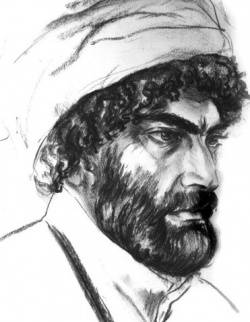
Gamzat met with the Khansha. Bahu, apparently cherishing the hope that at least eight-year-old Bulach remained alive, restrained and coldly congratulated him on the new conquered title of the Avar Khan. At that moment, the treacherous Gamzat made a sign to the Murid who was standing next to Bahu-Bike. The warrior without batting an eye chopped off an unhappy mother.
According to the second version, Gamzat first decided to crack down on Surkhay Khan, an ally of Russia with the rank of colonel, who also had rights to the throne of the Avar Khanate. Later, he transferred Bahu to the village of Genichutl, in which the Hansha spent the last days. Finally, Gamzat called the woman to him. But in the end, the same dirty and vile execution was repeated.
It is worth noting that close Gamzat-bek reacted to this reprisal extremely negatively. Even Shamil, who reproached the slain khans for infidelity, stated that there was no agreement to cut out all the Avar khans and khansha. Moreover, the future imam advised Gamzat to leave Hunzakh, in which he became hated. But the acting imam already imagined himself the ruler of all Dagestan. In addition, Gamzat said that it was more convenient for him to conduct a ghazavat from Khunzakh.
The joy of the self-styled Khan was short-lived
Shortly after the massacre of the khans, Gamzat turned his thirst for power at Tsudahar (Tsudahar society), which was in no hurry to accept Muridism and participate in the Gazavat. The Imam decided to take Tsudahar by cunning. He sent a letter demanding to let his army go, supposedly heading to Derbent. But the aksakals of Tsudahar, having heard about the vile murder of Bahu Bika and her children, did not believe the imam and gathered an army. Understanding the prospects, the Tsudahars fought with Gamzat so desperately that the latter escaped only by flight.
Meanwhile, discontent was ripening in Hunzakh. Murids behaved like masters, and the imam imposed new laws. Finally, a conspiracy has ripened. According to one version, the local respected old man Musalav could not stand it and told two young Khunzans Osman and Hadji Murad (the very hero of Tolstoy) that they, being milk brothers with the murdered Ummah Khan, are obliged to kill Gamzat.
On Friday, all Muslims began to flock to the mosque. Naturally, Gamzat-bey, the imam, also went to the mosque, but armed and accompanied by 12 murids. He had already been informed of a ripened conspiracy. Finally it is time for prayer. Suddenly, Osman loudly addressed all those gathered: “Why don’t you get up when the great imam came to pray with you?”
This served as a sign. Gamzat, sensing the evil, began to back off to the door. At that moment, several shots stopped him. The insidious imam fell into place. Murids, of course, rushed to avenge their leader, but only managed to shoot Osman. The Khunzans, who well remembered the vile murder of Bahu Bike and her children, dealt with the murids. The surviving associates of Gamzat took refuge in the Khan’s house, which the rebel Avars soon burned. The naked body of the former imam, contrary to tradition, was left lying around the mosque for four days as a punishment for deceit and sins.
Alas, the fate of the eight-year-old Bulach was no less tragic than the fate of his mother. Murids, learning about the death of their imam, went after the boy. Despite the protests of even the boy overseer, the murids seized him and, knowing that he could not swim, drowned the unfortunate in the river.
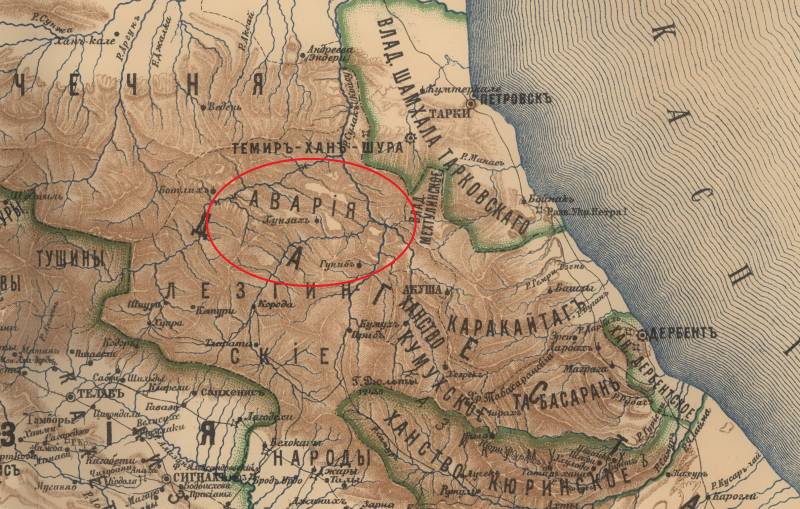
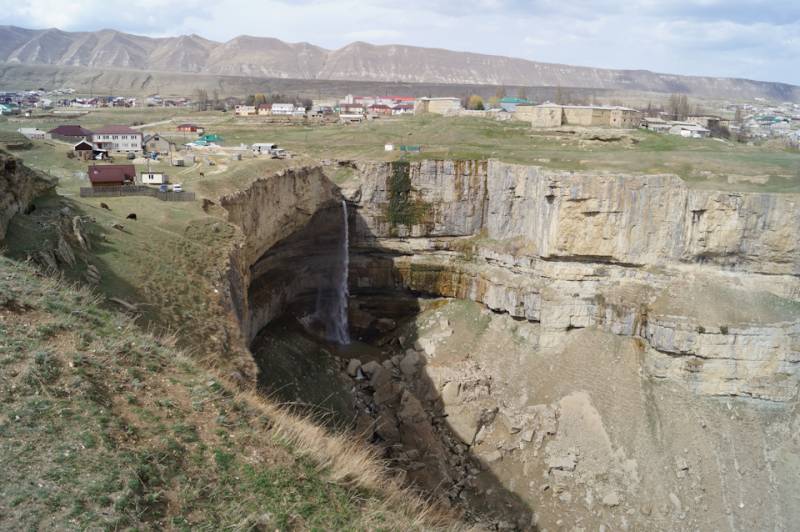
Information